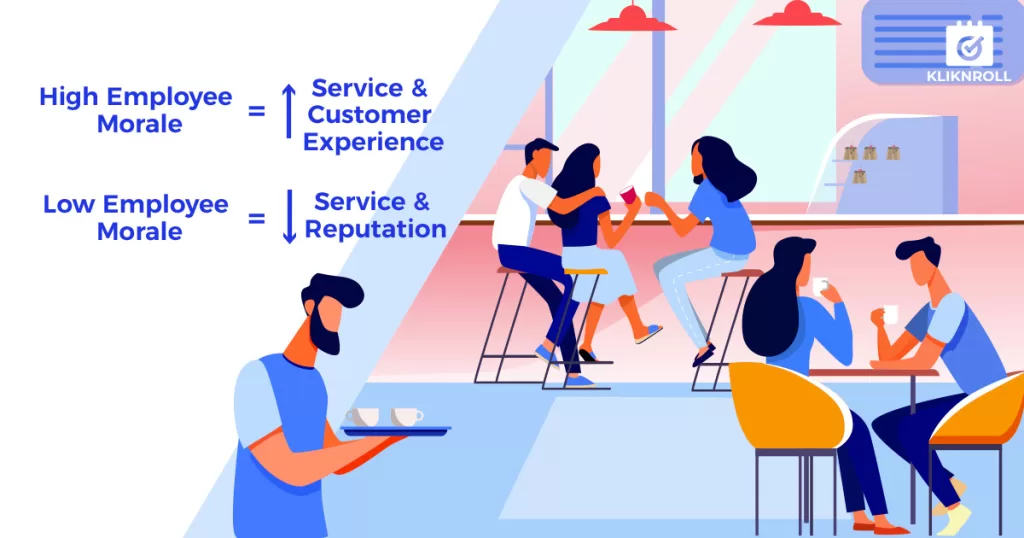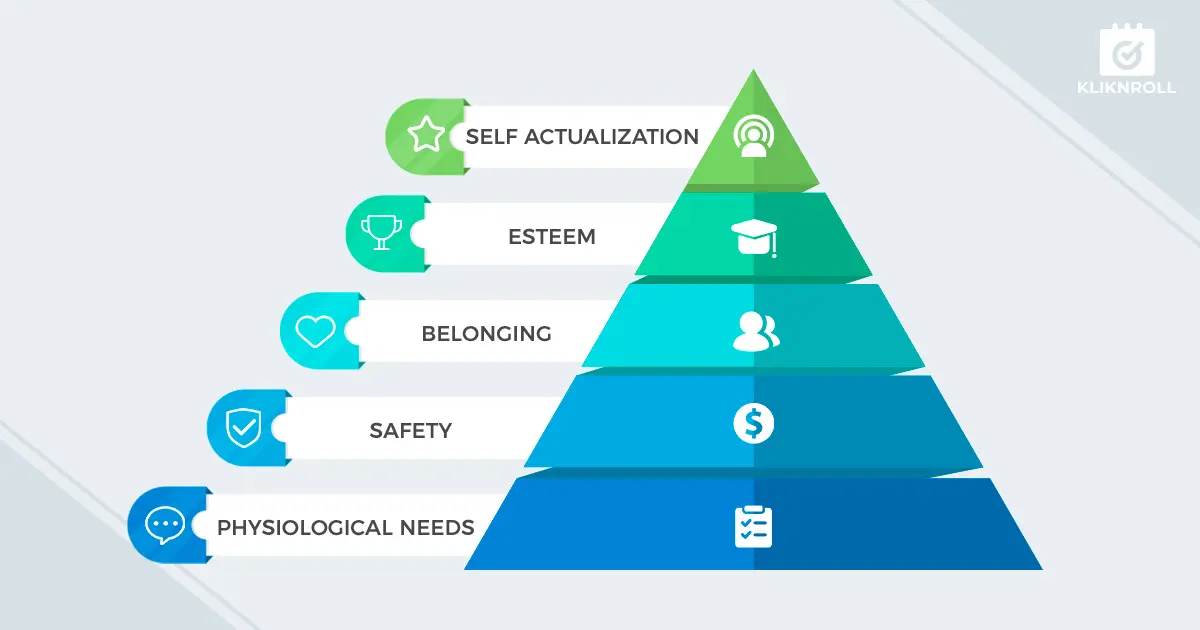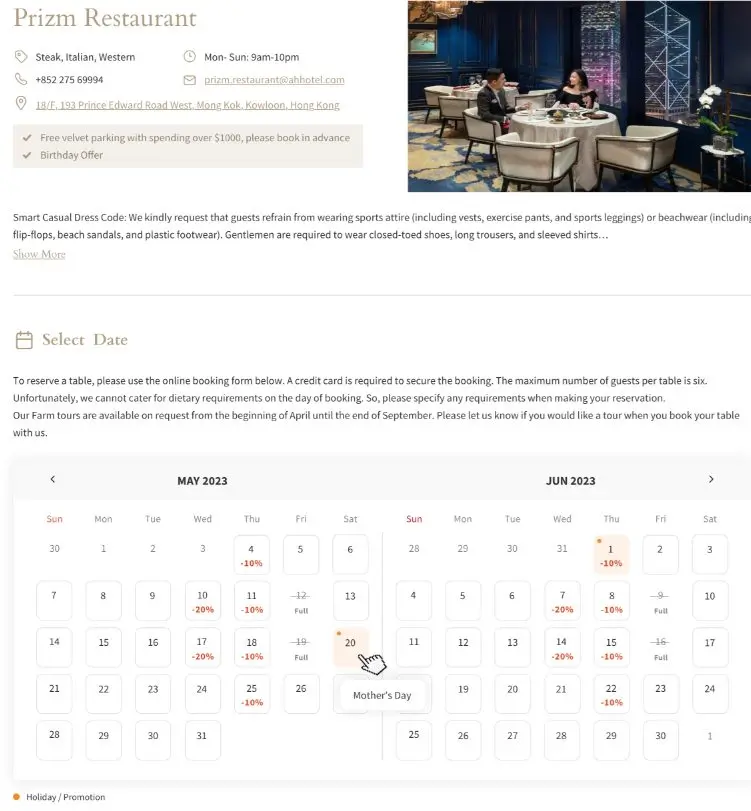Table of Contents
What is Employee Morale?
Employee morale is the emotional state, attitude, and outlook of your employees towards the company and its stakeholders.
For restaurants, in particular, it’s really important as they face customers directly every day – which can impact the level of service quality and satisfaction.
Maslow’s hierarchy of needs plays a huge role in employee morale, as you have to cover the basics first – something we’ll talk about later on in this article.
To a certain extent, pay does play a role in morale, but it’s not the be-all-end-all. Intrinsic happiness is what you should aim for by boosting employee morale in your restaurant.
Why is Employee Morale Important in Restaurants?

In places like restaurants, having happy and motivated employees is a big deal because they’re the ones directly connecting with your customers.
When your team’s morale is high, they’re not just friendly – they’ll be more willing to go the extra mile to give great service and prioritize customer experience.
On the flip side, low-morale employees can negatively impact your restaurant’s reputation over time.
They might take longer, be a bit more careless, and not be as patient with customers, which isn’t great for customer satisfaction.
Apart from service, employees with higher morale are a lot less likely to quit – which results in a lower staff turnover and costs for restaurants.
Training is a very resource and time-intensive thing for restaurants, and having to train new employees from scratch just for them to quit a while later is a huge problem in the restaurant industry.
Employee morale can also indirectly benefit restaurants in the way of word-of-mouth marketing.
Employees with high morale will be more likely to recommend your restaurant to friends and family – which could net more organic visitors.
Not to mention, it’ll be easier for you to recruit more employees if your employees have nothing but good things to say about the working culture!
What Factors Influence Employee Morale?
Restaurant employee morale is mainly influenced by factors from 2 different categories – which are internal and external factors. Internal factors are things to do with the company, culture, benefits, pay, and how employees are treated.
Whereas external factors consist of things that you rarely control like how customers treat your employees, their personal lives or even commuting times. Here are some practical examples of both:
Internal Factors

Internal factors are the aspects of the work environment that affect employee morale. We can use Maslow’s hierarchy of needs to understand these factors.
This pyramid has four employee needs categories (see the image above).
The bottom category is the most basic and essential for morale. The higher you go, the more engaged and motivated your employees are. Let’s explore the categories of the pyramid:
- Physiological Needs: The most basic thing that you can do is to pay your employees a competitive amount and provide a safe working condition. In Maslow’s theory, the base level is about survival (food, shelter, and water). However, in a business setting, this is more akin to earning enough to satisfy these basic needs, and a safe work environment plays a huge role in the first part.
- Safety needs: The next part of the pyramid has to do with safety, particularly job security. This is different from the point mentioned above as this has to do with the feeling of having a secure job that won’t be made redundant anytime soon.
- Belongingness and working culture: Next, comes the working culture and belongingness to the company. Having a good working culture with good management that is open to ideas and feedback is the key to tackling this part of the hierarchy.
- Esteem needs: After that, is the feeling of achievement and prestige. Esteem needs are usually satisfied by being recognized and rewarded for good performance. This could be in bonuses, more responsibilities, or promotions.
- Self-actualization needs: Self-actualization needs to refer to the desire for personal growth, achievement, and realizing one’s full potential within the workplace. Usually, employees who reach this stage are at the tip of employee morale. They’ll want to take on more responsibilities and be more open to upskilling.
External Factors
External factors are factors that the company or restaurant can rarely control. Things like how employees are treated by customers, personal life, and even the public image of your brand on social media.
Here are some practical examples of external factors that an everyday restaurant employee can face:
- Reviews on social media platforms: Employee morale can be influenced by what customers say on social media. Negative reviews can make employees feel bad and perform worse, which can lead to more problems. It can be even worse if customers name specific employees. On the other hand, positive reviews can help employees boost morale and perform better!
- Personal life: Whether it’s a family member falling ill or problems with their cars, this plays a contributing factor in morale on an individual level. Usually having a good working culture can be the remedy, as employees can talk about their problems without judgment.
- Customer treatment: For a restaurant, one of the biggest contributing factors to day-to-day employee morale would be how customers treat them. A rude customer can spoil your employee’s day, while a nice one can brighten it. Be sure to set boundaries and not tolerate employee abuse in your restaurant. Your employees will appreciate your stance!
Practical Ways to Boost Restaurant Employee Morale
Although there are certain things that you cannot control, you should focus on things that are within your control, to improve your restaurant’s overall morale. Here are some ways to do so:
Create a Good Workplace and Culture for Your Employees

A good workplace and company culture cover the fundamentals of the hierarchy that we’ve talked about earlier.
A positive restaurant workplace requires more than just the usual pay and benefits. Doing simple things like respecting your employee’s personal life outside work and removing a lot of the corporate friction can benefit your restaurant’s culture.
Try promoting open communication among all staff members. Regular meetings allow staff to share their opinions and ideas, creating a cooperative culture where everyone feels valued.
Think about the physical workspace, like your kitchen and dining area. Having a clean kitchen that is well-equipped for the type of cuisine that you’re serving can be a massive deal.
A lot of restaurants cheap out on equipment, and don’t take cost-per-use into account – which can take a toll on their employees doing a lot of unnecessary work.
Recognize, Reward, and Give Constructive Feedback
One of the best ways to boost employee morale is to acknowledge and reward them.
This shows them that you value their hard work and motivates them to do more for the customers.
You can use different types of recognition, such as commissions for upsells, bonuses for performance, or non-monetary benefits like extra time off or more responsibilities.
If they need to improve, give them constructive feedback that clearly shows what they need to work on.
The key is to tailor the feedback to each employee’s strengths and weaknesses and create an open culture where employees feel supported and confident that they can overcome their challenges.
Make sure to be open and reassure them that their weaknesses are fixable. Remember, job security also plays a huge role!
Free Meals Help Promote Employee Morale
Free meals are a great way to boost employee morale in restaurants, for more reasons than just saving money.
Free meals also make employees feel valued and appreciated, as they show that the restaurant respects and rewards their hard work and dedication.
This builds mutual trust and care between the employees and the restaurant. Free meals also improve the dining experience for customers, as your waitstaff would be able to describe dishes better, as well as upsell more – which can help increase revenue organically.
Free meals can also encourage a culture where employees can relax, connect, and enjoy food together, which further boosts their morale and performance.
Give Trusted Staff Key Responsibilities & Decision-Making
A good way to boost employee morale and move them up the pyramid is to give them more responsibilities and autonomy.
This gives them the ability to make key decisions without the approval of a manager, and can also help in reducing customer resolution time.
This is why startups are so flexible and fast, as they can adapt and change quickly, unlike big corporations where decisions take a long time and go through many levels of management.
So, giving your staff this freedom not only reduces your and upper management’s workload but also motivates them to feel more impactful.
However, there should be clear communication with your staff. Even though you let them make their own decisions, make sure they know the boundaries of what they can or cannot do!
Reduce Workload and Introduce Technology
A nuanced approach that reduces workload and integrates technology can boost restaurant employee morale.
You can also redistribute tasks based on each employee’s preferences and strengths. For example, some employees might like to handle the cash register, while others might enjoy serving certain areas.
This can increase efficiency and empower employees by aligning their roles with their skills, leading to a more satisfied and engaged workforce.
By using tools like an efficient ordering system or an online booking platform, you can reduce the pressure on staff and let them concentrate on more important tasks.
You can also offer training programs for new technologies, and recognize employees for their technical skills, to make them feel respected and confident.
You can even involve employees in the decision-making process when selecting and implementing new technologies. You can seek their feedback on user interfaces, functionalities, and potential improvements.
This can ensure that the technology matches the practical needs of the team and fosters a collaborative environment where employees feel valued as part of the restaurant’s progress!

If you take a look at our online booking system (Click2Book), your customers will be able to reserve their tables and even order their food, which lightens your workload considerably!
That’s not all, you can also track relevant information using your custom link such as the platform they came from, conversion rate, best time of day for conversion, etc.
We’ve designed our platform to not only be user-friendly but take conversion rate optimization in mind.
If you’re interested in seeing what we can do for you, click the button below to check out our product page to see many of our other features!
Train and Upskill Your Employees
Training and upskilling restaurant staff should be more than just routine learning.
You can try out cross-department training by teaching servers about kitchen operations and kitchen staff about customer service.
This can not only improve skills but also create a more unified team – as they can get a deeper understanding of what goes on in the restaurant as a whole.
Customize training based on what employees enjoy. Let them focus on what they’re interested in, like event planning. This can not only enhance morale but also make the restaurant staff more engaged!
Another great way to do so is to match experienced staff with newbies in a mentorship. This can not only assist with learning but also foster a supportive work culture.
Impostor syndrome is a common feeling among employees in any industry, which can lower their morale even in restaurants.
A mentorship program for newer employees can help reduce that and provide them with support and confidence!
Focus on Communication & Take Feedback
Communication doesn’t necessarily mean just being understood in the workplace, but it’s also creating a culture where each employee feels their voice is important.
Aside from team meetings, management should have regular one-on-one check-ins. These sessions give a dedicated space for employees to voice concerns, share ideas, and connect better with management.
Feedback, moreover, should be a two-way street. Instead of only providing feedback, motivate employees to share ideas and get involved – as management often doesn’t know what they go through in terms of operations.
A feedback loop can be useful where employees see their ideas in action, which can give them a sense of ownership and that their opinions matter, enhancing their morale.
In addition, try out things like team-building activities that are not only work-related. Play games and do activities that highlight individual talents, creating a stronger bond among team members.
A paid day trip to go hiking and enjoy nature could be a worthwhile investment – at least in our opinion!
Conclusion
To conclude, boosting employee morale in a restaurant is a complex task that requires more than traditional methods.
It’s essential to understand the emotional state, attitude, and outlook of employees, and use Maslow’s hierarchy of needs as a guide to meet their basic and higher needs.
Employee morale is crucial for restaurants, as it affects customer service, staff retention, and word-of-mouth marketing.
Internal factors, such as the work environment, organizational culture, and leadership style, influence morale, as well as external factors like customer feedback and personal situations.
Again, if you’re looking for a online booking system to streamline your operations, consider contacting using the button below – no strings attached!

Hey there! I’m Jeffrey Hau, and my journey in the digital world started after I wrapped up my psychology degree at UCLA. Imagine coming back to the bustling streets of Hong Kong from the tech haven of Silicon Valley – it was a whirlwind of inspiration! Seeing how social media platforms were evolving at breakneck speed and realizing the limitations of traditional advertising in this digital age, I decided to dive in.
In 2012, I laid the foundation of Prizm Group. From our humble beginnings, we’ve now blossomed into a global powerhouse with a team of over 200 passionate professionals. Our HQ is right here in Hong Kong, and we’ve spread our wings to SG, AU, NZ, JP, and China.
As a digital problem solver, our team found that several industries are in need of reservation systems, especially for F&B, Hotels, Beauty, and Medical sectors. Our digital magicians started crafting reservation systems tailored to cater to these specific needs. We extended our expertise to e-commerce, voucher management systems, and campaign management systems, combining them into KlikNRoll – an all-in-one solution. We deep dive into various industries, understanding their unique challenges and developing innovative solutions.
We’re not just a company; we’re your dedicated partners in transforming how you navigate the digital landscape. Our passion lies in providing businesses with intuitive and tailored solutions using KlikNRoll’s powerful capabilities.
Ready to embark on this exciting digital adventure with us? Let’s make your brand stand out in the digital jungle!






